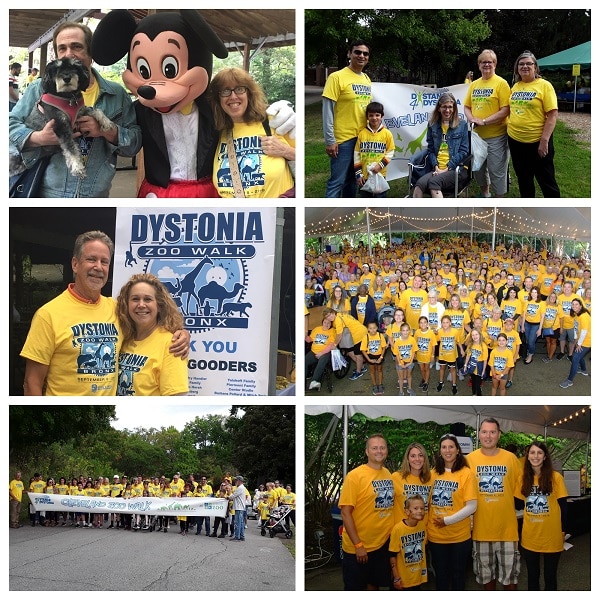Triple Header Dystonia Zoo Walks Raise Awareness & Funds for Research
 The first full weekend of Dystonia Awareness Month was marked by simultaneous Dystonia Zoo Walks in three cities on Sunday, September 8: Cleveland, NYC/Bronx, and Pittsburgh.
The first full weekend of Dystonia Awareness Month was marked by simultaneous Dystonia Zoo Walks in three cities on Sunday, September 8: Cleveland, NYC/Bronx, and Pittsburgh.
Thirteen Dystonia Zoo Walks are taking place across the country and are expected to raise $300,000 this year. Cumulatively, Dystonia Zoo Walks have raised $1.3 million in support of the Dystonia Medical Research Foundation’s mission to find a dystonia sure and offer programs for patients and families. National Sponsors include Allergan, Merz Neurosciences, and Ipsen.
The original Dystonia Zoo Walk took place 8 years ago in Cleveland, and has since become an annual event and replicated in cities across the country. Karen Flanagan conceived the event with family members Jane Ann Flanagan and Gale Flanagan. Karen Flanagan is affected by rapid-onset dystonia parkinsonism, a debilitating movement disorder that developed suddenly at age 20. Guest speakers this year in Cleveland included movement disorder specialist Aasef Shaikh, MD, PhD of University Hospitals, Cleveland VA Medical Center, and Case Western Reserve University. Dr. Shaikh is a past DMRF Clinical Fellow and member of the Medical & Scientific Advisory Council.
The 5th Annual Bronx Dystonia Zoo Walk was organized by Pamela Sloate, who has lived with severe dystonia since childhood and recently underwent deep brain stimulation, a neurosurgical procedure in which an implanted medical device delivers electrical stimulation directly into the brain to reduce dystonia symptoms. Sloate is a member of the DMRF Board of Directors and leader of the NYC Adult Dystonia Support Group. Guest speakers included Stan Fahn, MD, H. Houston Merritt Professor of Neurology and Director Emeritus of the Center for Parkinson’s Disease and Other Movement Disorders at Columbia University, who is largely credited with founding the movement disorders field. Dr. Fahn is a DMRF Lifetime Honorary Board Member. Attendees at the Bronx Dystonia Zoo Walk reflected both patient and medical communities, with numerous dystonia researchers and clinicians in attendance to show their support. Platinum Sponsors included Allergan, Merz Neurosciences, Ipsen, Mt Sinai Hospital, US WorldMeds, Macy’s, and the New York Rangers.
The 6th Annual Pittsburgh Dystonia Zoo Walk was organized by members of the Western Pennsylvania Dystonia Support Group. When event co-organizer Ed Cwalinski had deep brain stimulation surgery 19 years ago to treat severe generalized dystonia, he was the youngest person with dystonia ever to have the procedure. Now the procedure is done in children as young as 7 years. Co-organizer MaryRae Nee also underwent deep brain stimulation 17 years ago to control her severe dystonia. Chris Mack, Co-Host of The Fan Morning Show on 93.7 The Fan, and wife Tara Sorley organized the largest Zoo Walk team in honor of their 6-year-old son Braden who suffers from dystonia. Special guest speaker was Mary Flaherty, DO, Neurologist with Allegheny Health Network.
Upcoming Dystonia Zoo Walks are scheduled in Cincinnati, Los Angeles, Philadelphia, Phoenix, Providence, and Toledo.
Dystonia causes excessive, uncontrollable muscle spasms. The muscle spasms twist the body and limbs into involuntary movements and awkward postures. Estimates suggest that 70% of patients are misdiagnosed prior to a dystonia diagnosis.
For information about dystonia, treatments, support resources, and locating medical specialists, the Dystonia Medical Research Foundation (DMRF) can be reached at www.dystonia-foundation.org and 800-377-DYST (3978).



